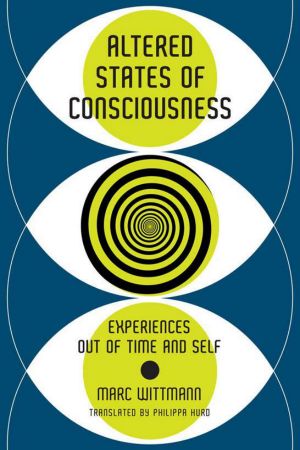Altered States of Consciousness · Experiences Out of Time and Self (The MIT Press)

- Authors
- Wittmann, Marc & Hurd, Philippa
- Publisher
- The MIT Press
- Tags
- altered states of consciousness , self-consciousness , time-consciousness , time perception , present moment , meditation , mindfulness , selflessness , timelessness , near-death experience , psychedelics , hallucinogens , depression , schizophrenia , epilepsy , drugs , hashish , cocaine , opium , addiction , mystic experiences , love , happiness , boredom , non-fiction , psychopharmacology
- ISBN
- 9780262038317
- Date
- 2018-08-27T23:00:00+00:00
- Size
- 0.58 MB
- Lang
- en
What altered states of
consciousness―the dissolution of feelings of time and self―can tell us
about the mystery of consciousness.
During extraordinary
moments of consciousness―shock, meditative states and sudden mystical
revelations, out-of-body experiences, or drug intoxication―our senses of
time and self are altered; we may even feel time and self dissolving.
These experiences have long been ignored by mainstream science, or
considered crazy fantasies. Recent research, however, has located the
neural underpinnings of these altered states of mind. In this book,
neuropsychologist Marc Wittmann shows how experiences that disturb or
widen our everyday understanding of the self can help solve the mystery
of consciousness.
Wittmann explains that the relationship between
consciousness of time and consciousness of self is close; in extreme
circumstances, the experiences of space and self intensify and weaken
together. He considers the emergence of the self in waking life and
dreams; how our sense of time is distorted by extreme situations ranging
from terror to mystical enlightenment; the experience of the moment;
and the loss of time and self in such disorders as depression,
schizophrenia, and epilepsy. Dostoyevsky reported godly bliss during
epileptic seizures; neurologists are now investigating the phenomenon of
the epileptic aura. Wittmann describes new studies of psychedelics that
show how the brain builds consciousness of self and time, and discusses
pilot programs that use hallucinogens to treat severe depression,
anxiety, and addiction.
If we want to understand our
consciousness, our subjectivity, Wittmann argues, we must not be afraid
to break new ground. Studying altered states of consciousness leads us
directly to the heart of the matter: time and self, the foundations of
consciousness.
"In this, another brief history of time, but now on its perception, as
opposed to physics, Wittmann takes us through the brain science of time
perception with clarity and insight. He covers new approaches to the
issue from psychological, neuroscience, and clinical studies with a good
emphasis on newer imaging studies that implicate brain regions,
particularly the insula in the time perception process. Altogether a
significant achievement in what is a scientifically a much understudied
aspect of human cognition." ―David Nutt, FMedSci and Professor of Neuropsychopharmacology, Imperial College London
"To
fully explore the deepest roots of time and the self (along with its
brain) you could ingest some ayahuasca, undergo a near-death experience,
study meditation for a decade―or read this book, Marc Wittmann's lively
tour of clinical and brain research into the temporality that is us." ―Dan Lloyd, Trinity College, coeditor of Subjective Time: The Philosophy, Psychology, and Neuroscience of Temporality and author of Radiant Cool: A Novel Theory of Consciousness
Marc Wittmann is Research Fellow at the Institute for Frontier Areas of
Psychology and Mental Health in Freiburg, Germany, and the author of Felt Time: The Psychology of How We Perceive Time (MIT Press).